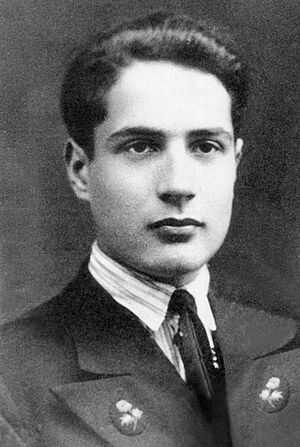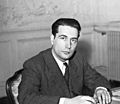François Mitterrand facts for kids
Quick facts for kids
François Mitterrand
|
|||||||||||||||||||||||||||||||||||||||||||||||||||||||||||||||
|---|---|---|---|---|---|---|---|---|---|---|---|---|---|---|---|---|---|---|---|---|---|---|---|---|---|---|---|---|---|---|---|---|---|---|---|---|---|---|---|---|---|---|---|---|---|---|---|---|---|---|---|---|---|---|---|---|---|---|---|---|---|---|---|
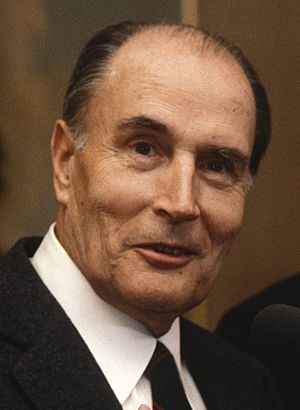
Mitterrand in 1983
|
|||||||||||||||||||||||||||||||||||||||||||||||||||||||||||||||
| President of France | |||||||||||||||||||||||||||||||||||||||||||||||||||||||||||||||
| In office 21 May 1981 – 17 May 1995 |
|||||||||||||||||||||||||||||||||||||||||||||||||||||||||||||||
| Prime Minister | |||||||||||||||||||||||||||||||||||||||||||||||||||||||||||||||
| Preceded by | Valéry Giscard d'Estaing | ||||||||||||||||||||||||||||||||||||||||||||||||||||||||||||||
| Succeeded by | Jacques Chirac | ||||||||||||||||||||||||||||||||||||||||||||||||||||||||||||||
|
|||||||||||||||||||||||||||||||||||||||||||||||||||||||||||||||
|
|||||||||||||||||||||||||||||||||||||||||||||||||||||||||||||||
|
|||||||||||||||||||||||||||||||||||||||||||||||||||||||||||||||
|
|||||||||||||||||||||||||||||||||||||||||||||||||||||||||||||||
| Personal details | |||||||||||||||||||||||||||||||||||||||||||||||||||||||||||||||
| Born |
François Marie Adrien Maurice Mitterrand
26 October 1916 Jarnac, France |
||||||||||||||||||||||||||||||||||||||||||||||||||||||||||||||
| Died | 8 January 1996 (aged 79) Paris, France |
||||||||||||||||||||||||||||||||||||||||||||||||||||||||||||||
| Resting place | Cimetière des Grands-Maisons, Jarnac | ||||||||||||||||||||||||||||||||||||||||||||||||||||||||||||||
| Political party | Socialist (from 1971) | ||||||||||||||||||||||||||||||||||||||||||||||||||||||||||||||
| Other political affiliations |
|
||||||||||||||||||||||||||||||||||||||||||||||||||||||||||||||
| Spouse |
Danielle Gouze
(m. 1944) |
||||||||||||||||||||||||||||||||||||||||||||||||||||||||||||||
| Children | 4, including Jean-Christophe and Mazarine | ||||||||||||||||||||||||||||||||||||||||||||||||||||||||||||||
| Relatives | Frédéric Mitterrand (nephew) | ||||||||||||||||||||||||||||||||||||||||||||||||||||||||||||||
| Alma mater | |||||||||||||||||||||||||||||||||||||||||||||||||||||||||||||||
| Signature | |||||||||||||||||||||||||||||||||||||||||||||||||||||||||||||||
| Military service | |||||||||||||||||||||||||||||||||||||||||||||||||||||||||||||||
| Allegiance | French Third Republic | ||||||||||||||||||||||||||||||||||||||||||||||||||||||||||||||
| Branch/service | French Army | ||||||||||||||||||||||||||||||||||||||||||||||||||||||||||||||
| Years of service |
|
||||||||||||||||||||||||||||||||||||||||||||||||||||||||||||||
François Mitterrand (born October 26, 1916 – died January 8, 1996) was the President of France for 14 years, from 1981 to 1995. This makes him the longest-serving president in French history. He was the first left-wing politician to become president under France's current system, the Fifth Republic.
Mitterrand started his political life with more conservative views. He even worked for the Vichy government during the early part of World War II. However, he later joined the French Resistance and moved towards left-wing politics. He served as a government minister many times before becoming president.
He was elected president in 1981 and again in 1988. During his time, he brought in many changes, like ending the death penalty. He also worked closely with German Chancellor Helmut Kohl to strengthen European integration. Mitterrand was a big supporter of culture and started many large building projects in France. He was also the first French President to appoint a female Prime Minister, Édith Cresson, in 1991.
Contents
Early Life and World War II
François Mitterrand was born in Jarnac, France, on October 26, 1916. His family was very religious and traditional. His father was an engineer. François had three brothers and four sisters.
He studied in Angoulême and later in Paris. For a short time, he was involved with a far-right group called the Volontaires nationaux. However, his friendship with a Jewish socialist friend, Georges Dayan, made him question some of his early nationalist ideas.
World War II Experiences
Mitterrand's actions during World War II have been discussed a lot. He was a sergeant in the army and was captured by German forces in June 1940. He was held as a Prisoner of War (POW) in Germany. He tried to escape twice before finally succeeding in December 1941.
After escaping, he returned to France. He got a job with the Vichy government, which was the French government that worked with Nazi Germany. He worked to help French POWs. During this time, he also secretly began working with the French Resistance.
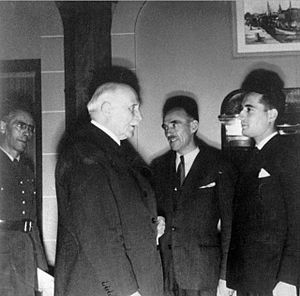
From 1942, Mitterrand became more involved with the Resistance. He helped create a network that mainly consisted of former POWs. This group helped provide false papers and gathered information for the Free French Forces. He used several code names, like "Morland."
In November 1943, Mitterrand had to escape to London after a raid by German secret police. He met with Charles de Gaulle, the leader of the Free French, but they had some disagreements. Eventually, Mitterrand's Resistance group merged with others, and he became its leader.
He returned to France and took part in the Liberation of Paris in August 1944. After the war, he helped with the liberation of concentration camps like Dachau.
Rise to Power in France
After World War II, François Mitterrand quickly re-entered politics. He became a member of the National Assembly in 1946. He held many different government positions, serving as a minister in eleven different roles. He was also the mayor of Château-Chinon for many years.
In 1958, he strongly opposed Charles de Gaulle's plan to create the Fifth Republic. Mitterrand believed de Gaulle's plan gave too much power to the president. This opposition led to him losing his seat in the National Assembly for a short time.
Challenging De Gaulle
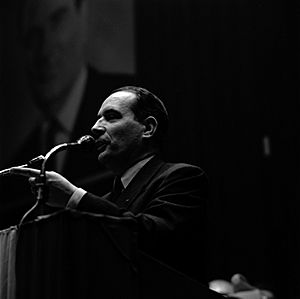
Mitterrand returned to the National Assembly in 1962. He pushed for left-wing parties, including the Communist Party, to work together against de Gaulle. In 1965, he ran for president against de Gaulle. Many people expected de Gaulle to win easily, but Mitterrand surprised everyone by getting 31.7% of the vote in the first round, forcing a second round. He lost the election but gained a lot of respect.
He then led a group of center-left parties called the Federation of the Democratic and Socialist Left. In 1968, after major protests in France, Mitterrand announced he would run for president if a new election was held. However, de Gaulle dissolved the Assembly instead, and Mitterrand's party suffered a big loss in the next election.
Leading the Socialist Party
After this defeat, Mitterrand turned his attention to the Socialist Party (PS). In 1971, he became the party's First Secretary (leader). He believed that an alliance with the Communist Party was essential for the left to win power.
In 1972, he signed a "Common Programme of Government" with the Communists. He ran for president again in 1974, as the left's candidate. He narrowly lost to Valéry Giscard d'Estaing, getting 49.19% of the vote.
Mitterrand faced challenges within his own party, but he remained its leader. For his third presidential campaign in 1981, he focused on a calm and reassuring image. He promised "another politics" based on the Socialist program. He won the election with 51.76% of the vote, becoming the first left-wing president elected by the people in the Fifth Republic.
Mitterrand's Time as President (1981-1995)
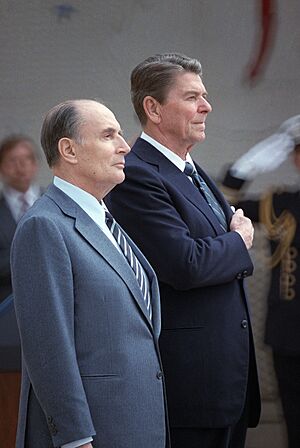
When François Mitterrand became president in 1981, he appointed Pierre Mauroy as Prime Minister. The Socialist Party won a majority in parliament, and some Communists joined the government.
Big Changes in France
His first years as president brought many changes:
- Economic policies: The government increased the minimum wage, shortened the work week to 39 hours, and gave workers 5 weeks of holiday per year. They also increased social benefits and nationalized some key companies.
- Social reforms: Mitterrand famously abolished the death penalty. He also made homosexuality legal and gave more rights to workers. Rules for police stops and arrests were made stricter.
- Cultural projects: He supported many large building projects, known as the "Grands Projets." These included the Louvre Pyramid, the Channel Tunnel, the Grande Arche at La Défense, and the Bastille Opera. He also opened up the media, allowing private radio and TV stations.
After two years, France faced economic challenges. Mitterrand's government shifted to a more cautious economic approach, focusing on controlling inflation.
Working with Other Parties
In 1986, Mitterrand's party lost the parliamentary election. This meant he had to appoint a Prime Minister from the opposing party, Jacques Chirac. This situation, where the president and prime minister are from different political sides, is called "Cohabitation." During this time, Mitterrand focused on foreign policy, while Chirac handled domestic issues.
Mitterrand was re-elected in 1988, becoming the first president to win two terms by popular vote. He then appointed Michel Rocard as Prime Minister. In 1991, he appointed Édith Cresson, who became the first female Prime Minister of France.
However, the Socialist Party faced difficulties and lost the 1993 election. This led to a second "cohabitation" with Edouard Balladur as Prime Minister.
France's Role in the World
Mitterrand continued France's strong role in international affairs. He supported closer European cooperation and worked closely with German Chancellor Helmut Kohl to create the Maastricht Treaty. This treaty was a big step towards a more unified Europe.
He also addressed France's relationship with its former colonies in Africa. In 1990, he gave a speech in La Baule, linking development aid to democratic efforts in these countries.
Later Life and Legacy
François Mitterrand's second term ended in May 1995. He died in Paris on January 8, 1996, at the age of 79, from prostate cancer. His funeral was a national day of mourning, attended by many world leaders.
Mitterrand's presidency changed French politics. He made the French Left a strong political force and saw the Socialist Party become very important. He also oversaw many social and cultural changes that still affect France today.
Prime Ministers During Presidency
Mitterrand had the most prime ministers during the Fifth Republic.
| Prime Minister | From | To | Party | Notes |
|---|---|---|---|---|
| Pierre Mauroy | 1981 | 1984 | Socialist | |
| Laurent Fabius | 1984 | 1986 | Socialist | The youngest Prime Minister since 1820 (39 years old) |
| Jacques Chirac | 1986 | 1988 | RPR | First "cohabitation" |
| Michel Rocard | 1988 | 1991 | Socialist | |
| Édith Cresson | 1991 | 1992 | Socialist | First female prime minister |
| Pierre Bérégovoy | 1992 | 1993 | Socialist | |
| Édouard Balladur | 1993 | 1995 | RPR | Second "cohabitation" |
Political Career Highlights
François Mitterrand held many important positions throughout his career:
- President of the French Republic: 1981–1995 (re-elected in 1988).
- Government Minister: He served in various ministerial roles from 1947 to 1957, including Minister of Justice and Minister of the Interior.
- Member of Parliament: He was a member of the National Assembly for Nièvre from 1946–1958 and 1962–1981. He was also a Senator for Nièvre from 1959–1962.
- Local Government: He was the President of the General Council of Nièvre from 1964–1981 and Mayor of Château-Chinon from 1959–1981.
- Party Leader: He was the First Secretary (leader) of the Socialist Party from 1971–1981.
Honours
Mitterrand received many awards and honours from France and other countries.
France
 Grand Master of the Legion of Honour
Grand Master of the Legion of Honour Grand Master of the Ordre national du Mérite
Grand Master of the Ordre national du Mérite
Foreign Honours
He received top honours from many nations, including:
 Mexico: Grand Collar of the Order of the Aztec Eagle (1981)
Mexico: Grand Collar of the Order of the Aztec Eagle (1981) Denmark: Knight of the Order of the Elephant (1982)
Denmark: Knight of the Order of the Elephant (1982) Spain: Collar of the Order of Isabella the Catholic (1982)
Spain: Collar of the Order of Isabella the Catholic (1982) Japan: Grand Collar of the Order of the Chrysanthemum (1982)
Japan: Grand Collar of the Order of the Chrysanthemum (1982) Germany: Grand Cross, Special Class of the Order of Merit (1983)
Germany: Grand Cross, Special Class of the Order of Merit (1983) United Kingdom: Honorary Knight Grand Cross of the Order of the Bath (1984)
United Kingdom: Honorary Knight Grand Cross of the Order of the Bath (1984) Sweden: Knight of the Royal Order of Seraphim (1984)
Sweden: Knight of the Royal Order of Seraphim (1984) Netherlands: Grand Cross of the Order of the Netherlands Lion (1991)
Netherlands: Grand Cross of the Order of the Netherlands Lion (1991) Poland: Grand Cross of the Order of Merit of the Republic (1993)
Poland: Grand Cross of the Order of Merit of the Republic (1993)
Images for kids
See also
 In Spanish: François Mitterrand para niños
In Spanish: François Mitterrand para niños


